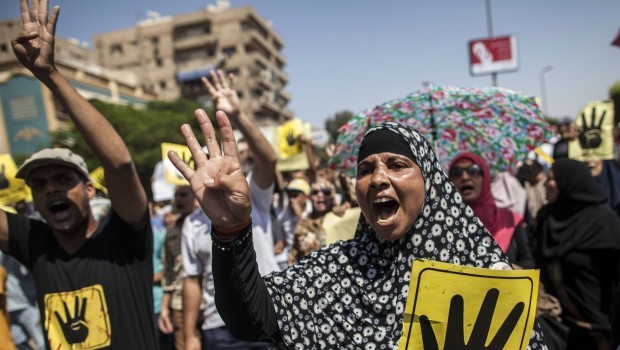
Supporters of ousted Egyptian president Mohamed Morsi raise posters with the four-finger symbol during a demonstration against the military-backed government in the Egyptian capital, Cairo, on September 13, 2013. (AFP PHOTO/MAHMOUD KHALED)
Cairo, Asharq Al-Awsat—In an interview with Asharq Al-Awsat, Ashraf Sayed, a senior member of the Building and Development Party, the political arm of the Al-Gama’a Al-Islamiyya, denied the group was responsible for the violence that has erupted in Egypt since the ouster of Islamist president Mohamed Mursi on July 3.
Sayed told Asharq Al-Awsat that the Al-Gama’a Al-Islamiyya, a member of the pro-Mursi National Alliance in Support of Legitimacy, “will not despair and will continue protesting peacefully until the end of the military coup.”
Ashraf said that his party would continue operations during this period, particularly at the local government level. He added that leaders are able to coordinate through phone conferences, as they are avoiding meeting in person due to tight security measures.
“Most of the members of [Al-Gama’a Al-Islamiyya] and its party have not been arrested and are actively operating in the National Alliance in Support of Legitimacy under the leadership of Dr. Nasr Abdel Salam, the party’s former leader, given the absence of Dr. Tarek Al-Zumar, the incumbent leader, who is keeping a low profile like other figures, including engineer Assem Abdel-Majid . . . due to prosecution against them and out of fear of persecution.”
“Zumar and Abdel-Majid are both in Egypt,” he said, adding that “all they have done is [making] heated statements at Raba’a Al-Adawiya rallies.”
Tarek Al-Zumar and his cousin, Abboud Al-Zumar, were imprisoned in Egypt for 30 years after being found guilty of involvement in the assassination of President Anwar Sadat on October 6, 1981. They were released in the wake of President Hosni Mubarak’s ouster.
Sayed denied they had any connection to recent events in Minya and Kerdasa, which have been the site of several large-scale raids by the Egyptian Army against militant groups this week.
Egypt’s public prosecutor had ordered the arrest of several Al-Gama’a Al-Islamiyya leaders, including Zumar and Abdel-Majid, on charges of incitement, committing violence and attacking public property.
On Wednesday, Egypt’s Criminal Court froze the assets of Zumar and Abdel-Majid.
The Islamist figure blamed “thugs” for the violence in the streets, stressing that the “police were watching churches being burned without intervening.”
Asked about the explosions that ripped through Sinai following Mursi’s ouster, Sayed said that his group is completely isolated from Sinai, denying that any Al-Gama’a Al-Islamiyya or Muslim Brotherhood supporters are present in the Egyptian peninsula.
“There are hundreds of thousands going out to protest against the coup in all [Egyptian] governorates,” but the “media is trying to conceal that,” he said.
Al-Gama’a Al-Islamiyya, which was founded in the early 1970s, was involved in violence against the government during the 1980s and 1990s, such as the assassination of the Egyptian President Anwar Sadat in 1981 and the Luxor Massacre that caused the death of 58 tourists in 1997.
